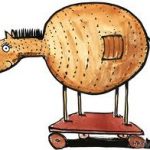Those who can, teach; those who can’t ridicule
Who you callin’ a teacher? Why we love ’em in theory and loathe them in practice
“Lack of experience” is the charge levelled at Mr. Trudeau in the Conservatives’ attack ads. What, the Tories wondered, had the new Liberal Leader done to deserve his lofty perch? He’d been a camp counsellor, a rafting instructor and, direst of all, “a drama teacher” (this was said in a tone reserved for “known typhoid carrier”).
The Canadian Teachers’ Federation protested, with its president telling the Ottawa Citizen that “people were very insulted that their profession was targeted in that way.”
Interestingly, instead of running away from the “teacher” slur in his rebuttal ad, Mr. Trudeau slyly embraced it. There he was, sitting on a desk, in front of a calculation-filled blackboard, like a particularly butch Anne Shirley. All we needed was a winsome tot handing him a red apple to complete the picture.
Could there have been a clearer demonstration of our ambivalent – a fancy word for “deeply messed up” – relationship to teachers? Is there another profession that’s so loved in theory and so loathed in practice?
The love is everywhere to see, so long as it doesn’t cost us anything: Countless books, films and documentaries take a scrappy teacher as a hero. Sometimes, he’s battling a misguided establishment and a mistrustful student body. Or she’s trying to take the hormonal clay of adolescence and shape it into something that won’t horrify the world. They’re underpaid, sarcastic and spunky, and we root for them.
Every year, the U.S. celebrates National Teacher Day, and celebrities take to Twitter to praise the Sir or Miss who helped them muddle through calculus, saved them from bullies or perhaps just looked at a D on a spelling test and said, “Have you ever thought about acting?” “A great teacher is a key to success,” said Jon Hamm in a video of gratitude, and it’s hard not to tear up a little.
But these are easy sentiments that cost nothing. In real life, teachers get scant thanks from a public that expects them to perform ever greater miracles with ever fewer loaves and fishes. Parents simmer in fury when teachers withdraw their voluntary extracurricular support to fight for their bargaining rights, as they did recently in Ontario, or when they walk off the job, as they did in B.C. last year.
There’s a particular store of resentment directed at teachers, perhaps because so much of their work is invisible to the outside world, but more likely out of numbing jealousy that they get summers off. “In America,” Frank McCourt wrote in Teacher Man, his memoir of three decades in New York high schools, “doctors, lawyers, generals, actors, television people and politicians are admired and rewarded. Not teachers. Teacher is the downstairs maid of professions. Teachers are told to use the service door or go around the back. They are congratulated on having ATTO (All That Time Off). They are spoken of patronizingly and patted, retroactively, on their silvery locks.”
It’s not any different in Canada. Consider the Conservatives’ animosity toward teachers, which perhaps springs out of the party’s natural suspicion of any profession that’s in the business of spreading knowledge, not hiding it.
Now is not the time to “commit sociology,” Prime Minister Stephen Harper said this week. It seemed odd, considering that the Oxford English Dictionary tells us that sociology is “the study of the development, structure and functioning of human societies,” which seems relevant at any time of the year.
I think what he might have meant is “Now is not the time for asking questions.” I wondered what my most inspiring teacher, Mrs. Allen, who taught high-school sociology, would have said. Probably, “I’d rather commit sociology than ignorance,” and then would have screamed, “Tony and Maria, sit down,” which was her way of ensuring that half the class took their seats. Lots of Italians in my high school.
Instead of scoffing at teachers, politicians might take a leaf from David Miliband’s exercise book and try doing it themselves. Two years ago, the former British foreign secretary went back to his North London high school to teach a course in politics. The kids told him about their disdain for politicians, so he tried to explain how the system worked. He brought his students to Parliament to show them the meat-grinder of democracy and introduced them to the legendary 81-year-old Labour MP Dennis Skinner, known fondly as the Beast of Bolsover. The kids must have been at least grudgingly impressed.
Not surprisingly, Mr. Miliband found that teaching was a humbling gig. “The UN General Assembly felt like a tough audience for a 15-minute speech when I spoke there,” he wrote. “This was much tougher.” He might have put it another way: Those who can, teach; those who can’t, make fun of them.




